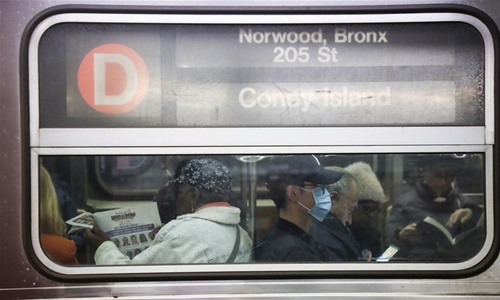
Passenger with face mask is seen in a metro train in Manhattan of New York, the US, on March 4. Photo: Xinhua
Prisons in the US may become the next epicenter of the coronavirus outbreak, as they are particularly vulnerable to viral spreading due to the fragmented jail management model in the US, as well as Washington's lax attitude toward prevention work, warned Chinese observers.In the face of a surging number of infections on US soil, the country's jails and prisons are stepping up preventive efforts, such as "screening, testing, appropriate treatment, prevention, education, and infection control measures," to prevent the virus from spreading, Justin Long, officer of public affairs with the US Federal Bureau of Prisons (BOP), told the Global Times on Tuesday.
Long said that there are no known cases of COVID-19 among Bureau of Prisons inmates at this time.
Observers, however, warned that US jails are on high alert for an intense coronavirus outbreak, which is likely to put the roughly 2.2 million people under the country's penal system in danger.
Jails are especially vulnerable to the spread of disease, as stuffy spaces dense with strangers and poor hygiene conditions provide prime opportunities for the virus to grow, Diao Daming, an associate professor at the Renmin University of China in Beijing, told the Global Times.
The US penal system is made up of federal prisons, state-administrated prisons and private prisons, said Diao, noting that the fragmented management model also increases the risk of a coronavirus outbreak.
Each state is currently adopting a different attitude toward virus prevention, and their ability to battle the spread varies; moreover, different states and the federal government are now fighting this battle separately, making it harder to form a unified mechanism to tackle an outbreak in jails, Diao said.
Long said that the BOP updates and refines its recommendations, guidance, and protocols as the virus continues to spread in the US, and will continue to provide helpful information to staff, inmates and federal, state and local partners.
The increasing number of cases of US community infection also points to a higher possibility of an outbreak in prisons, considering the close link between the prison system and community in a country where community correction is prevalent, said Shen Yi, associate professor of international politics at Fudan University in Shanghai.
In Italy, the country with the second largest number of coronavirus cases worldwide, at least seven inmates have died as unrest and protests exploded in the prison system after officials imposed visiting restrictions.
The US government should now make hard decisions in the face of this potential outbreak, such as reducing prisoners' contact with the outside world and putting newcomers under quarantine, Shen advised.
But based on the US' current lax attitude toward virus prevention, it may only step up to the plate after an outbreak occurs, Shen predicted. "By then it will be too late."
The Life Care Center, a nursing home in Kirkland, Washington state, is at the center of the US coronavirus outbreak. During the center's first official press conference since the outbreak, Tim Killian, the public information liaison for the facility, said on Saturday that since February 19, 13 people associated with the center have been diagnosed with coronavirus and died.
The US woke up on Wednesday to find the number of infections had surpassed 1,000, with 31 deaths.


